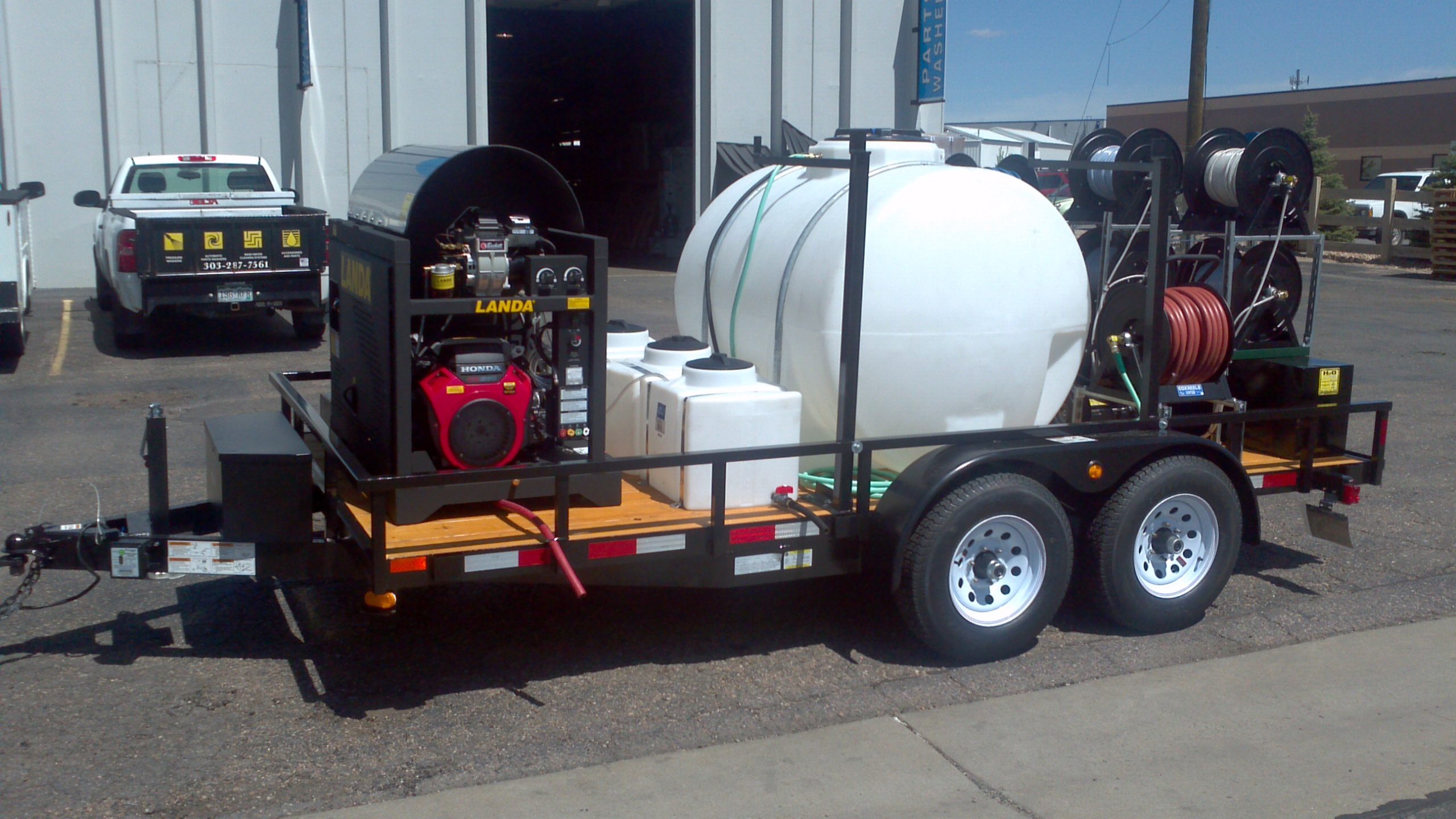
When it comes to building a power washing business, your rig is your lifeline. But one of the first big decisions you’ll face is whether to go mobile or stationary with your equipment. 💡
Should you invest in a trailer-mounted setup and take your services on the road? Or is a fixed-location wash bay better for your business model? And what about hybrid setups that offer both?
In this article, we’ll walk you through the pros, cons, and use cases for mobile, stationary, and hybrid power washing rigs — so you can make the smartest choice for your goals, budget, and local market. 🚛🧠
🔍 What’s the Difference?
Let’s quickly define the options:
- Mobile Rig: Equipment is mounted on a trailer or truck and taken to job sites.
- Stationary Setup: Equipment is fixed at a single location, like a shop or warehouse, and customers come to you.
- Hybrid Setup: Combines a fixed base of operations with one or more mobile units.
Each has its benefits — and choosing the right one can impact everything from your startup costs to your ability to scale.
🛻 Mobile Power Washing Rigs
Mobile setups are by far the most common for residential and commercial exterior cleaning. They give you freedom, flexibility, and access to more job types.
✅ Pros of Mobile Rigs:
- Go Where the Work Is – You’re not limited by location. You can service homes, storefronts, construction sites, fleets — wherever the dirt is. 🧽
- Low Barrier to Entry – You don’t need to rent a shop or property. Many mobile setups can be launched from your garage or driveway.
- Scalable – Add another trailer or truck as your business grows.
- Professional Image – A well-branded trailer or truck is a moving billboard. 🚐
- Tax Benefits – Mileage, fuel, maintenance, and equipment depreciation are all deductible.
❌ Cons of Mobile Rigs:
- Weather Dependency – Rain, snow, or freezing temps can cancel jobs. ☔❄️
- Daily Setup/Teardown – You’ll need to load, prep, and clean your rig every day.
- Transportation Costs – Fuel, insurance, and wear-and-tear add up.
- Storage Needs – Trailers take space and may require off-site storage or special permits.
- Security Concerns – Mobile rigs are theft targets, especially overnight.
🛠️ Who it’s best for:
- Residential cleaners
- Fleet washers
- Commercial/retail exterior services
- Roof and gutter specialists
- Seasonal or part-time operators
🧰 What a Typical Mobile Rig Includes:
- Commercial-grade pressure washer (cold or hot water)
- Surface cleaner
- Water tank (100–500 gallons)
- Hose reels (high pressure + garden hose)
- Chemical tanks + downstream injector or proportioner
- Storage for ladders, safety gear, detergents
- Branding (wraps, magnets, signage)
A basic starter trailer can cost $5,000–$12,000, while pro setups can hit $20K+ depending on equipment and customization.
Browse Amazon Here For Mobile Pressure Washing Setups And Accessories
🏢 Stationary Power Washing Setups
A stationary setup means all your gear is fixed in place at a physical location. These are rare for residential washers but common for fleet washing, equipment cleaning, and industrial clients.
✅ Pros of Stationary Setups:
- Weather Protection – You can operate in a covered or indoor wash bay, rain or shine. 🌦️
- No Transport Required – No fuel costs, no trailers, no worrying about traffic.
- More Efficient Workflow – Equipment is always set up and ready to go.
- Easier Wastewater Management – With a fixed location, you can install reclaim systems and drainage filters. ♻️
- Higher Volume Potential – Some facilities process dozens of vehicles or machines per day.
❌ Cons of Stationary Setups:
- You Need the Clients to Come to You – That requires location, signage, and strong visibility.
- Higher Startup Costs – You may need to lease commercial space and outfit it with plumbing, power, and environmental controls.
- Limited Service Area – You won’t reach residential or jobsite customers without a mobile option.
- Local Zoning and Permits – Not every location allows wash bays or chemical runoff.
- Harder to Scale – Opening another location = huge investment.
🧠 Who it’s best for:
- Fleet washing companies with recurring B2B clients
- Heavy equipment cleaning (construction, farming)
- Partnerships with auto dealerships, truck stops, or rental yards
🧼 Common Stationary Setup Features:
- Fixed hot water system (gas or electric boiler)
- Water reclaim system with filtration
- Overhead hose booms
- Drainage trench or catchment basin
- Concrete surface or metal grate floor
- Eco-friendly chemical systems
- Automated control panel
A professional wash bay can range from $20,000–$75,000+ to build out, depending on specs.
Browse Amazon Here For Commercial Pressure Washers And Accessories
🔀 Hybrid Setups: The Best of Both Worlds?
As your business grows, a hybrid model may make sense.
Here’s what that might look like:
- A stationary base for equipment maintenance, office admin, and high-volume contracts
- One or more mobile crews for residential and field work
- The ability to bring vehicles or machinery to your facility or go to them
💼 Example Use Case:
You run a mobile house washing crew during the week but bring in fleets on Saturday mornings to a fixed wash bay you’ve partnered with. Multiple income streams, optimized efficiency. 🎯
📊 Cost Comparison: Mobile vs. Stationary
| Cost Area | Mobile | Stationary |
|---|---|---|
| Initial Investment | $5,000–$20,000 | $20,000–$75,000+ |
| Monthly Overhead | Low–Medium | High |
| Transport Costs | High | None |
| Storage Requirements | High (trailers, gear) | Low |
| Jobsite Flexibility | Very High | None |
| Weather Dependence | High | Low |
| Environmental Control | Limited | High (filtration, reclaim) |
🧮 The best setup for you depends on your budget, your target clients, and your long-term goals.
🤔 So Which Setup Should You Choose?
Ask yourself:
- Who am I serving?
– Homeowners? Commercial lots? Fleets? Equipment yards? - Where are my clients located?
– Scattered suburbs? Dense city? Industrial zones? - What services do I offer now — and want to offer later?
– Do you need mobility now but want a shop later? - What’s my startup budget?
– Can I afford the infrastructure of a stationary setup? - Am I trying to scale fast — or build a niche operation?
Your rig is your business — but it should also fit your lifestyle, territory, and vision for the future.
🧽 Final Thoughts: Your Setup = Your Strategy
There’s no one-size-fits-all answer. A mobile rig gives you flexibility and low startup costs — perfect for most residential and early commercial pros. A stationary setup offers consistency, volume, and operational control — better for advanced B2B operations.
And if you’re thinking long-term? Consider building toward a hybrid model that grows with you. 💼📈🧼
Whatever you choose, invest in the tools and layout that make your work faster, safer, and more professional — because the rig you build today will either limit or launch your success tomorrow. 🚀🛠️
Browse Amazon Here For Top Rated Power Washers And Accessories






